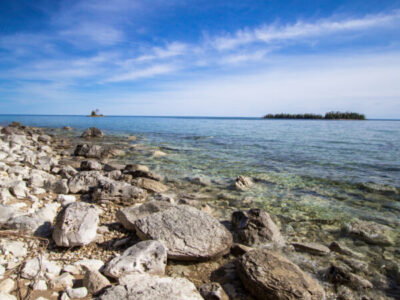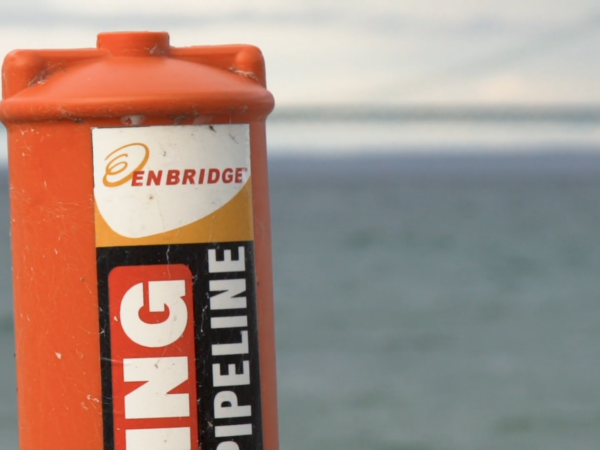
By Kelly House, Bridge Michigan
The Great Lakes News Collaborative includes Bridge Michigan; Circle of Blue; Great Lakes Now at Detroit Public Television; and Michigan Radio, Michigan’s NPR News Leader; who work together to bring audiences news and information about the impact of climate change, pollution, and aging infrastructure on the Great Lakes and drinking water. This independent journalism is supported by the Charles Stewart Mott Foundation. Find all the work HERE.
Michigan regulators say they need more evidence about safety, engineering and fire and explosion risks before deciding whether to let Enbridge Energy move its Line 5 petroleum pipeline into a tunnel beneath the Straits of Mackinac.
The move adds more delay and uncertainty for a controversial project that Enbridge had originally hoped to begin last year.
The three-member Michigan Public Service Commission on Thursday directed Enbridge to submit more evidence related to safety, engineering and maintenance on the proposed tunnel and the existing dual-span pipeline before deciding whether to grant Enbridge a key permit it needs to begin construction.
“This has been an extensive process,” Commission Chair Dan Scripps said before a packed conference room in Lansing Thursday. “We want to make sure that we get it right, and that is the rationale behind reopening the record for development of additional information.”
The decision came as a surprise for Line 5 supporters and foes, who had been bracing for commissioners to either grant or deny the permit after years of deliberations. Multiple people spoke out against the project at the meeting, while tunnel supporters showed up clad in blue t-shirts emblazoned with “Build the Great Lakes Tunnel.”
“I’m so thankful that this didn’t get approved today,” audience member Jody Daniels told the commissioners. “Thank you for that. But you need to seriously understand that even building the tunnel would bring devastation.”
In a statement, Enbridge spokesperson Ryan Duffy said the company will work to address commissioners’ remaining questions, while adding “we believe that extensive information documenting the engineering and safety of the Great Lakes Tunnel is already included in the MPSC record.”
Duffy said Enbridge remains committed to building the tunnel.
“It will make a safe pipeline safer, assure long term energy security and reliability, and support Michigan jobs and the economy,” he said.
A four-mile segment of the 69-year-old petroleum pipeline currently rests exposed at the bottom of the Straits, vulnerable to ships’ anchors in the busy shipping channel. Widespread concerns about the risk of an oil spill from the pipeline prompted Enbridge to hatch the tunnel plan in 2018, gaining the Republican-led legislature’s approval in the final days of then-Gov. Rick Snyder’s administration.
Enbridge calls it a promising safety solution for a pipeline repeatedly struck by anchors, while opponents argue the tunnel project poses safety hazards of its own, and ensures decades more of fossil fuel dependency at a time when scientists say humanity must rapidly transition to green energy or face worsening consequences from climate change.
An apparent anchor strike in June 2020 that damaged the existing dual-span pipeline in the straits prompted Gov. Gretchen Whitmer to order the pipeline permanently shuttered by May 2021.
Enbridge has defied that request, continuing to pump petroleum products through Line 5 while challenging the state’s order in federal court. State officials argue Enbridge is operating the pipeline in violation of state law, while Enbridge argues the state lacks the legal authority to shut down the cross-border pipeline that travels from Superior, Wisconsin, to Sarnia, Ontario.
At the same time, Michigan Attorney General Nessel is pushing for a shutdown through a lawsuit she filed in Ingham County Circuit Court in 2019. Enbridge has requested the case’s removal to federal court while state lawyers seek to keep it in state court.
Beyond the MPSC review, Enbridge is still awaiting a U.S. Army Corps of Engineers review that could take years, and is facing legal challenges to tunnel permits the company already secured from the Michigan Department of Environment, Great Lakes and Energy.
In the interim, construction costs are rising and timelines are expanding. Enbridge has acknowledged that the project, initially clocked at $500 million, will cost more. And the company has told prospective tunnel contractors to anticipate groundbreaking no earlier than 2024 — at least three years behind the original construction schedule.




